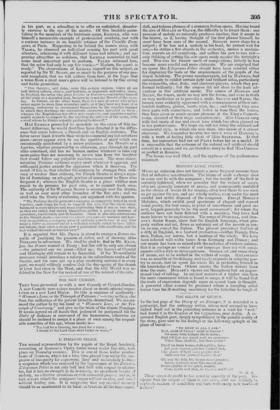L' INGANNO FELICE.
THE second representation by the pupils of the Royal Academy, consisting of ROSSINI'S Opera (semi seria) under this title, took place on Thursday evening. This is one of those feeble produc- tions of Rossusi, which for a long time placed him under the sus- picion of incapacity for expressing deep and melancholy feeling : a suspicion which was removed by the appearance of his Zv!,nir.,. L'Inganno Felice is not only half and half with respect to charac- ter, but it has no strength in its harmony, no prominent beauty of melody, no effective situations or rich concerted pieces ; and is, in fact, a work which the composer began without an idea, and ended without finding one. It is surprising that any musical memory should be so mechanical in its habit, as to retain all the unamennag, dull, and tedious phrases of a common Italian opera. Having heard the airs of MOZART or Clrets, the difficulty is to forget them : one passage of melody so naturally produces another, that it seems to the hearer, as if, having thought of the first phrase himself, he must have been • sure of the second. RossiNi never stops for a subject ; if he has not a melody in his head, he cannot wait for one,—he strikes a few chords in the orchestra, makes a modula- tion, repeats an old symphony, and suffers his pen to run riot— only thinking of getting his new opera ready against the fortnights end. This was his former mode of composition; latterly he has become more careful and more elaborate. We are surprised that an opera like L'Inganno Felice should have been selected either for displaying the taste or the acquirements of the pupils of the Royal Academy. The young accompanyists, led by MAWKES, had occasionally to exhibit certain light and brilliant solos, particularly the violoncello, oboe, flute, and clarionet-players, which they per- formed brilliantly ; but the singers did not show to the least ad- vantage in this artificial music. The voices of HODGES and BRIM, the tenors, made no way into the house, and were in truth so very ineffective as to provoke a smile. SEGUIN and SAPIO, the basses, were evidently oppressed with a consciousness of their out- landish feathers, gloves, boots, wigs, gee. ; and though they gave their parts with correctness, and better in tune than the tenors, they have given us much greater pleasure at the Kings Concert- room, divested of their stage accoutrements. Miss CHILDE sang with that nicety of ear and sweet tone which has often pleased us in her performance. We hope she will not bring the artificial and ornamental style, in which she now sings, into music of a graver character. We remember hearing her sing a song of HANDEL'S, with a truth of feeling little short of Miss STEPHENS. At that time, her instructors had not set PASTA before her as a model. It is impossible that the extreme of the natural and artificial should coexist in a singer, and we are therefore sorry to find Miss CHILDE so perfect in ROSSINI.
The house was well filled, and the applause of the performance vehement.


















 Previous page
Previous page